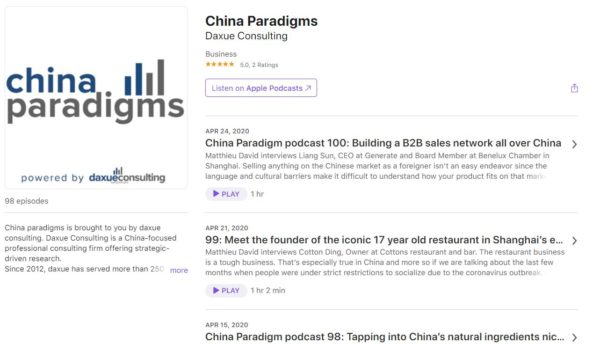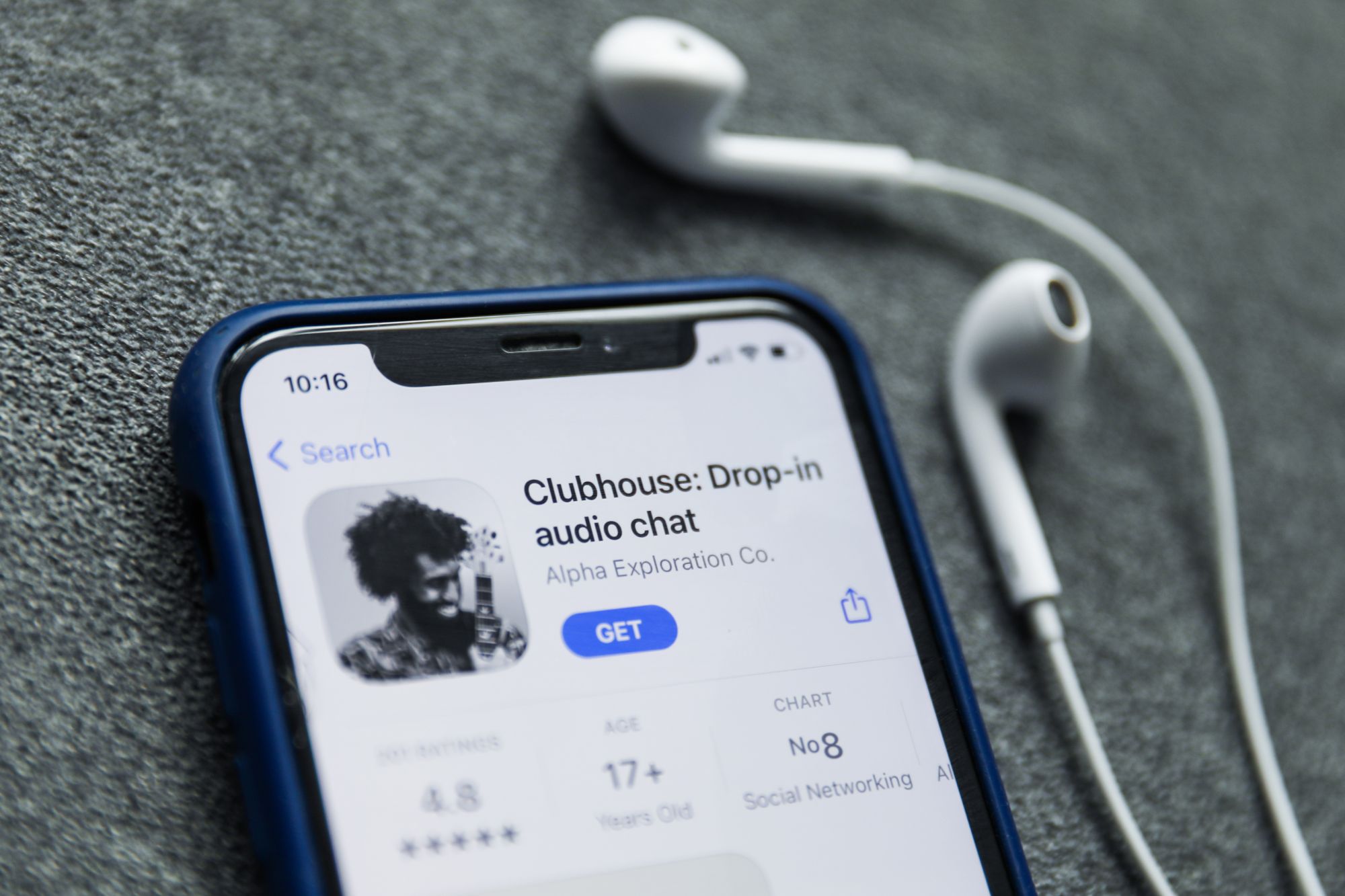The wave of Clubhouse blew from Silicon Valley to Chinese social networks. Since Elon Musk, the founder of Tesla, joined a chat room on Clubhouse, this audio-only social app has become a buzz with netizens around the world. According to App Annie, Clubhouse has exceeded 8.1 million downloads worldwide, and 4.6 million come from February 1st to February 16th. Clubhouse in China has also become a new trend among young people.
On Clubhouse, users can select topics that interest them, like tech, business, music or health, and then join those chatrooms for discussion. Users can join the conversation, or just listen. There are no posts, no pictures or videos, but only voice.
Although Clubhouse in China started only being available in Apple Store by invite-only and is now blocked, it does not stop mainland Chinese users from downloading it and buying invitation codes. Large numbers of Chinese netizens flooded into Clubhouse and talked about their careers and life.

Source: Baidu Index; search volume of Clubhouse in China from Jan 1st to Mar 9th.
Baidu index shows that from February 2021, Clubhouse search volume climbed rapidly, reaching a peak on February 8th. Unsurprisingly, after a short uncensored period, Clubhouse in China got blocked, just like most large western social platforms, Twitter, Facebook, and Instagram. However, the seeds of a great idea have been planted, and many Clubhouse-like apps are sprouting in up all over the country.
Audio social apps are nothing new in China
In the Chinese online audio market, audio social, like Clubhouse, is not a new concept. As early as 2007, YY Chatroom (YY yuyin), audio-based social networking among online game players, has existed in the Chinese marketplace for years. In 2019, some social audio apps, like Soul, Zhiya Live, and Inyu, have overtaken WeChat to rank top on the download volume of social category in the app store.
For example, Zhiya Live provides templates for users to record singing and reading, and the system will give labels by analyzing “voice identification”. According to these voice labels, it will match strangers to chat.
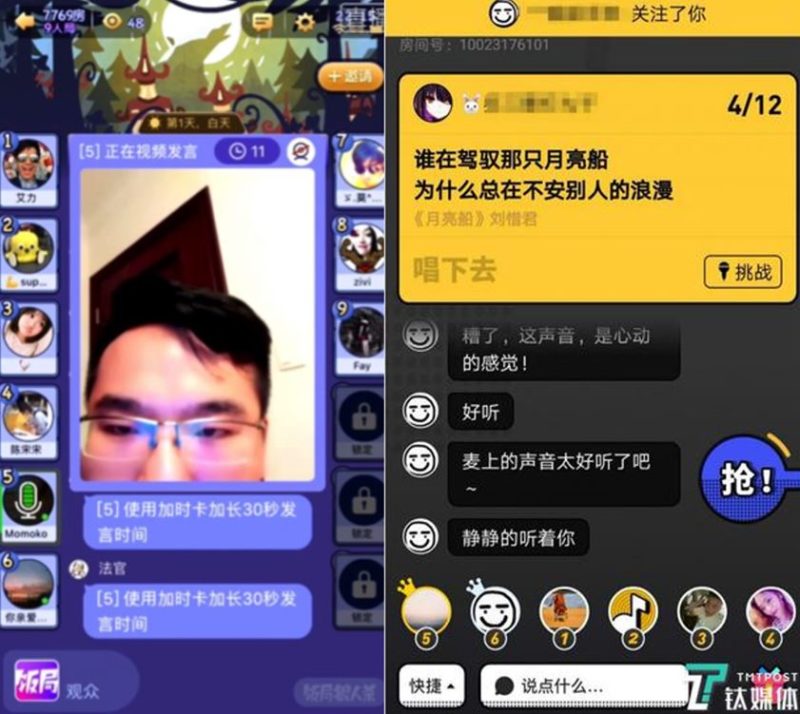
Source: Sohu.com, radiichina.com; Left: werewolf, Right: Inyu
Inyu is an online karaoke platform where users can sing together in the online room.
Werewolf is a popular party game in China. A mobile-version of the game called “Werewolf” has also been launched. Although it is a mobile game, it is a chatroom-based, hence lots of youngsters treat it as a social tool to make new friends online.
However, different from those audio social apps and podcasts in China, Clubhouse is more like a combination of podcasts and social media apps, which meet the demands of both. In the previous audio social products, either one leader speaks while others listen, or a crowd of people all speak at once, both scenarios being suboptimal for socializing.
What did Chinese netizens talk about on Clubhouse?
China’s elites talk about the internet and investment
Under the influence of Elon Musk, the early adopters on Clubhouse in China are mainly engaged in the internet and investment, and other entrepreneurial fields. Thus most of the topics in the Chinese-speaking rooms focus on internet products, investment, stock market, and so on. Many mainland Chinese internet entrepreneurs, like the founder of Zhihu (the biggest question and answer websites in China), the CEO of Weibo (the biggest social media platform in China) and the founder of Guokr (a well-known science and technology online community in China), also joined Clubhouse chatrooms.
On the one hand, these core users have higher-education backgrounds and are willing to share high-quality content on Clubhouse. On the other hand, people are able to talk with them directly, unlike other social media platforms where people can only reach out to them over texts. Public figures and quality topics have a strong appeal to Chinese netizens.
Additionally, Clubhouse’s content is on-par with paid knowledge podcasts, but it is free. It attracts many knowledgeable content creators in various professional fields. Under such a Clubhouse room, a discussion led by the core KOLs, and listeners who are interested have the opportunity to participate in the discussion, which also improves the quality of the conversation compared to traditional paid podcasts.
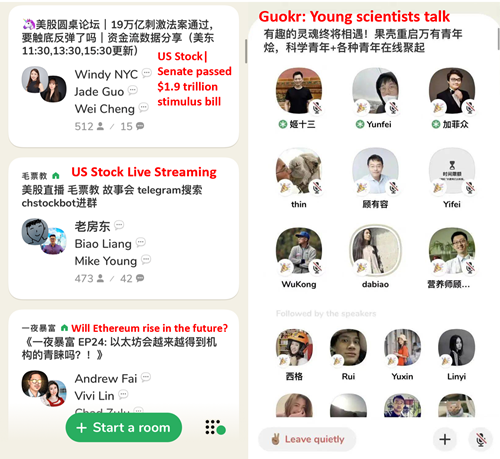
Source: Clubhouse screenshot; left: investment chatrooms; right: Guokr young scientists talk.
First-hand celebrity gossip
Like any social media platform, gossip is ever-present. At first, it started as a conversation among people who work in film and television, but soon the topic turned into rumors around celebrities. Participants shared their work experiences with celebrities and expressed their personal emotions to a certain celebrity. However, these facts cannot be checked. As a result, the general audiences take anything as factual evidence, which led to false rumors that can easily spread on Clubhouse.
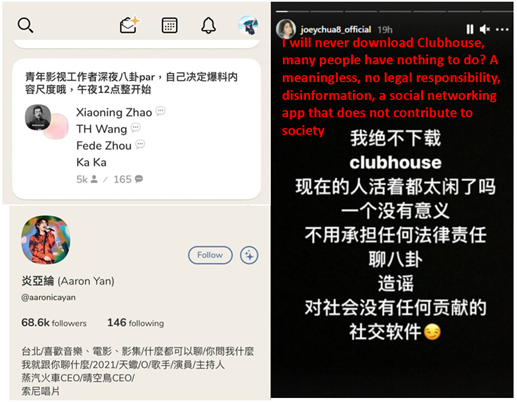
Source: Clubhouse screenshot; Left: some famous celebrities and gossip rooms on Clubhouse; Right: a celebrity complained about rumors on Clubhouse.
A day later, many celebrities themselves had to clarify rumors on social media. Malaysian singer, Joey Chua, even said that she would never use Clubhouse and Clubhouse was an app that did not contribute to society at all.
Chinese Clubhouse rooms are a place for fan-clubs to unite
In addition, rooms about the imitation show and karaoke talent show are also emerging. Many users named their rooms after famous TV shows, and changed their avatars as characters to “seriously” act out famous scenes from films. More and more users find their various interests on Clubhouse. There are regular activities in these rooms every day. Most Clubhouse users admit that this is the real reason they are addicted to it.

Source: Weibo; a netizen said she found her interest on Clubhouse
An unusual discussion between youngers from two sides of the Taiwan Strait
For netizens from mainland China, the most unique of Clubhouse is a rare opportunity to engage in genuine dialogue with people from other countries. In turn, this is the same feeling for netizens from outsides of mainland China, because in most cases it is difficult for people to know whether a robot (wumao) or a real person is behind a Chinese account on other social media platforms.

On Clubhouse, Chinese-speaking users can communicate more directly across the gap between simplified and traditional characters. Clubhouse brings together different Chinese speakers who live in mainland China, Hong Kong, Taiwan, Singapore, and Los Angeles. Communicating in Chinese builds a sense of “same”, an atmosphere that can only be achieved through voice.
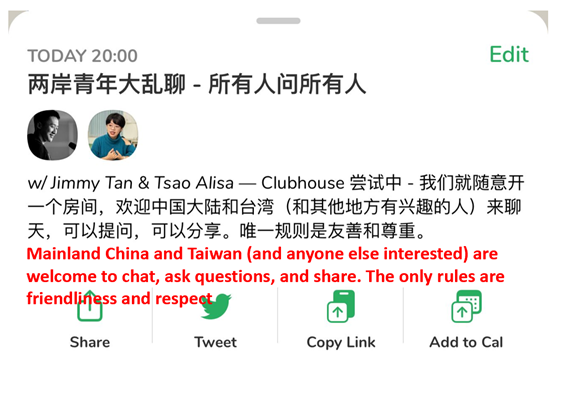
Source: Clubhouse; Cross-Strait youth talk
According to BBC News, the chatroom host of “Cross-Strait youth talk”, a 28-year-old Taiwanese, said, she was surprised by how many people participated in the discussion, and at the same time, she was happy to see people sharing without fear and listening patiently. In recent years when the relationship between Beijing and Taipei has become intense, it is uncommon that young people from mainland China and Taiwan are able to communicate rationally without prejudice.
Also, not all conversations about politics, speakers from both sides also shared memories with each other’s visiting experience. A Taiwanese said she finally got to see the snowy Houhai lake in Beijing, while a mainland Chinese said that his favorite song was “About Taipei”.
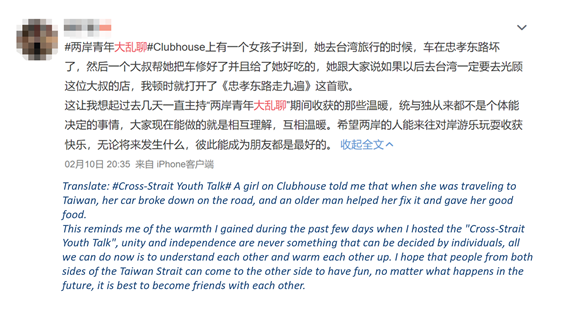
Source: Weibo; a netizen talked about his warm feeling on Clubhouse’s Cross-Strait chatroom.
As more and more Chinese netizens were active on Clubhouse, sensitive topics about current affairs in China also began to appear in many chatrooms. Such discussions indicated the coming ban from Chinese authorities. The “Great Firewall” set up by the government immediately prevents conversations on Clubhouse in China.
After the Clubhouse ban, copycats have arisen in China
Many Clubhouse-like apps have appeared in the Chinese market. Sun Yuchen, a Chinese crypto entrepreneur, the winner of a lunch date with Warren Buffet in 2019, announced the launch of a Chinese version Clubhouse called TWO sooner after the buzzing of Clubhouse in China. And the internet giant Alibaba’s MeetClub is almost no different from Clubhouse’s interface.
According to the article from 36Kr, Spaceship (飞船, feichuan), a Clubhouse-like app from the second popular short video platform Kuaishou, has entered the test phase of invitation. The owner of the biggest short video platform Douyin, ByteDance, also does not give up this opportunity, but the plans are still in progress.
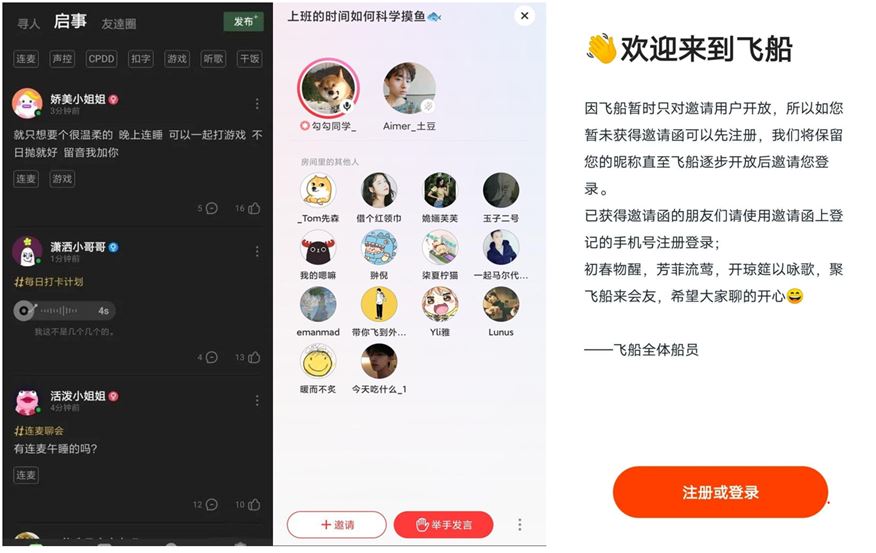
Source: 36kr; Left: TWOapp.com; Middle: Alibaba’s Clubhouse-like app MeetClub; Right: Kuaishou’s Clubhouse-like app Spaceship
In addition to new products, some existing products also created Clubhouse-like features. Xiaomi has reworked its MiTalk app to an invitation-only audio platform aimed at “a voice chat-app for professionals”. NetEase Music, one of the most popular music streaming platforms in China, in its latest version, added a new mode “KanKan” (侃侃) that allows users to interact via audio.
Censorship regulations make Clubhouse-like apps hard to live in China
Let’s Talk (对话吧) from Yingke Live perhaps had the quickest rise and fall among Clubhouse-like apps in China. On February 20th, Let’s Talk hosted a conversation called “Will Clubhouse work in China” and invited many influential entrepreneurs and university professors. On that day, Let’s Talk downloads skyrocketed. However, only 2 days later, on February 22, Let’s Talk was removed from Apple and Android app stores, less than two weeks after it launched. Yingke said that it was due to the need for product optimization.

Source: Sohu.com; Clubhouse-like app Let’s Talk from Yingke
In fact, there are strict content regulations in China on podcast and audio apps all the time. In 2019, the Cyberspace Administration of China (CAC) has punished 26 audio apps, including a range of voice-based social apps. Some reasons cited by CAC were pornographic contents and historical nihilism, which damaged the internet environment and had bad influences on teenagers.
Therefore, although Clubhouse in China has made a splash in the crowded social media industry, a direct Clubhouse clone probably would not succeed. The setback of Yingke reminds technology companies that they have to find the balance between sensitive content and open discussions. It made many audio social platforms in China putting emphasis on gamification. Like Karaoke Rooms and Werewolf, interaction among participants ensures content quality and user engagement.
As time goes by, the trend Clubhouse in China has started to phase out, and which company can take the title of the Chinese version of Clubhouse is still unknown. But it is worth knowing that, for any audio social apps like Clubhouse, they need to understand the rules of censorship and create an app that fits the Chinese market.
Learn something new? Stay updated on the Chinese market by following our WeChat, scan the QR code below, or subscribe to our newsletter

Learn more about China’s digital ecosystem, see our report on WeChat mini-programs
Listen to over 100 China entrepreneur stories on China Paradigms, the China business podcast
Listen to China Paradigm on Apple Podcast
